#bg3 deep dive
Text
Illithid Souls - Part 3
The Case Studies: Karlach and Gale
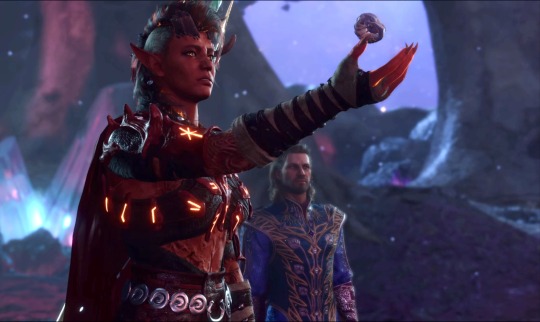
Welcome to the third and final part of this wild deep dive rabbit hole monstrosity that is the three-part series about illithid souls and whether mind flayers, or specifically you as a mind flayer, have a soul.
If you read Part 1 and Part 2, then you know that yes, illithids have souls, they're just different souls that the gods don't recognize as souls because they're non-apostolic, or incapable of divine worship (as opposed to being apostolic like most humanoid souls). You now also know that you turning into a mind flayer is a bit of a special case because of the Netherese magic in the tadpoles, and this might be why you retain more of your soul than normal mind flayers would.
Also, a quick reminder of the two theories we're working with here: Theory 1 is that when someone becomes a mind flayer they essentially just die and their (apostolic) soul moves on to the Fugue Plane and the mind flayer body just gets a new illithid soul from somewhere. Theory 2 is that when someone becomes a mind flayer their soul is transformed and altered into an illithid soul, which remains tethered to the mind flayer body. BG3 seems to operate more on the Theory 2 side of things, but as we'll see with Karlach and Gale, it's more complicated than you think.
So let's deep dive, shall we?
The Case of Karlach
I'm going to be candid here and say that the mind flayer ending for Karlach makes me really sad, even knowing that there's a very high chance that her soul is mostly intact and she is mostly still Karlach. But there's no denying she's at least a little different, though the game tries to comfort us otherwise after she transforms.
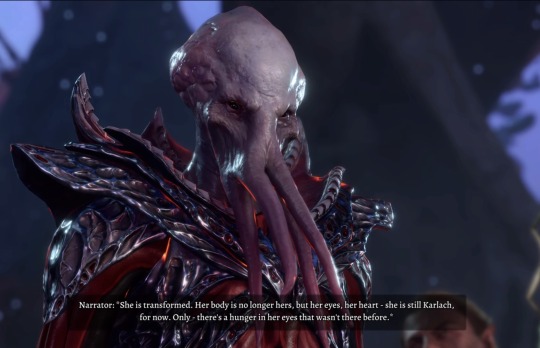
Narrator: *She is transformed. Her body is no longer hers, but her eyes, her heart - she is still Karlach, for now. Only - there's a hunger in her eyes that wasn't there before.*
That "for now" is rather ominous, isn't it? But we have enough evidence from Tav/Durge/other Origins and Orpheus to suggest that the likelihood of her retaining her memories and her personality is very high. In fact, when you talk to her during the epilogue, she does seem mostly the same, though her language has mellowed out to a more formal tone and she speaks less colloquially (and swears less and less).
If you talk to her immediately after she transforms, she marvels that she's still "herself" but also "more," which again reinforces that we all get to be special mind flayers who don't completely lose our souls. But I think there are some interesting lines in this dialogue:
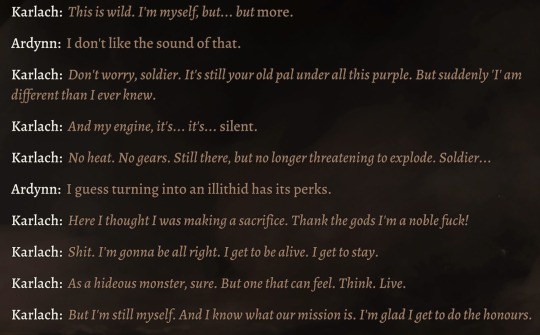
Karlach: This is wild. I'm myself but... but more.
Player: I don't like the sound of that.
Karlach: Don't worry, soldier. It's still your old pal under all this purple. But suddenly 'I' am different than I ever knew. And my engine, it's... it's... silent. No heat. No gears. Still there, but no longer threatening to explode. Soldier...
Player: I guess turning into an illithid has its perks.
Karlach: Here I thought I was making a sacrifice. Thank the gods I'm a noble fuck! Shit. I'm gonna be all right. I get to be alive. I get to stay. As a hideous monster, sure. But one that can feel. Think. Live. But I'm still myself. And I know what our mission is. I'm glad I get to the do the honours.
Karlach reiterates over and over that she's still herself, but you can literally hear the change in her voice. Where normally her tone and volume would be boisterous, loud, and energetic, she's now calm and mellow, even when she's swearing. Her tone here is more one of wonder. It isn't just the internal and external fires that have calmed down, her overall demeanor seems "cooler" too.
Also, in her romance ending just before the epilogue, where you're both in the Elfsong Tavern room, you can mention that she does seem a little altered.

Player: I still love you, Karlach. I still want to be with you.
Karlach: I love you too. Before, that love was an irrepressible inferno. Now it is a calm, cool object of beauty.
Player: I can see you're still yourself, but there's something else in there too. An illithid calm.
Karlach: Maybe you're right. I feel less... changeable. Less afraid. I feel ready for whatever is to come.
It doesn't tell us much, but it does reinforce that when we or any of our companions turn into a mind flayer, we likely retain a lot of our former personality, but in a much more calm, even-keeled kind of way. Again going back to the idea that our soul is still there, still mostly the same, but has been made a bit more illithid.
What is more interesting for Karlach, specifically, is her discussion of her diet as a mind flayer. Remember what souls are allegedly made up of? Intelligence, personality, and what else?
Memories.

Karlach: For example, my favourite food used to be mutton chops. Do you know what it is now? Brains, soldier. Brains.
Player: Comes with the illithid territory, I suppose.
Karlach: True. But I've found ways to maintain my values while respecting that which I am - that which made it possible for me to live. I've made arrangements with a healer in the city. When a patient is beyond saving, but still able to speak for themselves, they're offered a choice. They can go as nature intends to take them. Or, when they're ready - when their goodbyes have been said, their affairs settled, and all that awaits them is pain - I relieve them. When I consume their brains, I am nourished by much more than the physical nutrition. Their memories - from birth to death - become part of me. I've lived hundreds of childhoods, first loves, marriages, feuds and friendships. I remember them all. And in this way, we all live on. Together.
There's so much to unpack here. One, she still remembers her values, even six months later, but is trying to negotiate her former humanoid values (and personality, I imagine) with her needs as a mind flayer. That seems very Karlach, through and through.
But then, when she consumes these dying patients' brains, she absorbs and retains their memories. I imagine their souls still go on to the Fugue Plane, because I highly doubt that mind flayers also consume souls when they eat brains, but it still leaves me with questions. Karlach isn't part of a hivemind, which normally circulates memories between each other, but she's becoming a similar kind of receptacle for memories, and only she is the one that contains them, rather than an entire hivemind.
I have to wonder how much something like constantly consuming and remembering memories that are not your own affects you as a person/creature. Does that eventually lead to a loss of self, as you begin to "live" multiple different lives? Or does it all count as mere knowledge?
In some ways this would put her in competition with any elder brains still out there, but she's also not collecting knowledge for the sake of knowledge. She's collecting memories and living them out in her mind, which is a certain kind of tragedy. She's literally living vicariously through these people because her mind flayer body is too scary to go out and about in, and she's making up for a decade of life she didn't get to live. She's alive, but she's not...living if that makes sense. And again...how long before all these memories start to change who she is?
(An aside. I really don’t think her eating brains and collecting memories keeps someone’s soul from moving on. If you use the spell Speak with Dead, you don’t call back an entire soul, but the corpse still has access to its memories. I think in this case, even though memories make up part of a soul, Karlach consuming brains and collecting memories is more like her downloading a copy of the memories for herself. The dead person likely still takes their own memories with them to the Fugue Plane, where they will be judged by Kelemvor or collected by their favorite deity. She’s just copy/pasting data, not transferring everything from one hard drive to another, if that analogy makes sense.)
This arrangement where Karlach consumes the brains of dying patients is expanded or clarified a bit if you're romancing her during the epilogue, and also includes a reference to souls as well.

Karlach: I can’t wait to say hello, but to be honest, I’m keen to visit the doctor before it gets too late. He said there’s a potential in his infirmary. A very old woman recently diagnosed with a wasting sickness. She seemed interested in what I have to offer. I’ll want to have a good long talk with her before we make an arrangement. Though if I’m being very selfish, I hope she’ll say yes. I’m absolutely famished - and think of all those memories.
Player: Glad to hear. I was worried you were getting hungry.
Karlach: I don’t hide it well, do I? Some things don’t change, even when everything else does. It’s funny. I’m hungry in my body, but in my soul too. That woman has lived a long life - births, deaths, love, misfortune. And if she agrees, I’ll be able to give her a dignified end, and remember it all in her honour.
Or if you go with a different option:

Player: I'm still not sure how I feel about this arrangement. Are you sure it's ethical to feed on the dying?
Karlach: I'm sure of very little these days. But at least this way, I can live. And those who offer themselves to me can live on too. Births, first loves, marriages, losses - I remember them all and always will. Each memory I've consumed is of value.
It's just so interesting to me. One, her remark that she's eager to say hello but slightly more interested in chatting to a doctor about her next meal suggests that some elements of becoming a mind flayer are much harder to ignore. I imagine if she's hungry, she feels less like Karlach. (And I have thoughts, for another post, about whether she becomes "too fixated" on living when she's a mind flayer, given the cost of what it means to stay alive as a mind flayer.)
But she also says she's hungry in her soul. Her soul seems deeply interested in these memories, and I wonder if that's because memories are (or could be) part of souls themselves. Maybe the remark isn't really that deep, but she specifically connects the hunger of her soul to all the memories a long-lived woman will have. It's almost as if these memories nurture her soul, but it's unclear whether that is because it's somehow healing to see and "experience" life in ways she can't now that she's a mind flayer, or if it's because the memories have some kind of tangible effect on her soul/souls in general.
I suppose we won't know for sure. What we do know from Karlach's case, however, is that a great deal of the original soul (personality, memories, etc) seems to stick around even six months later, though there are noticeable changes in personality, such as an overall calm demeanor. There are also hints that consuming brains could lead to further changes down the road, but there's nothing really concrete. Just hints.
In the end, Karlach is still Karlach, and her soul still has plenty of elements of the original Karlach, even six months later. This is a good sign, but we can't completely ignore that her new body/mind as a mind flayer will necessarily mean some things have permanently changed. Whether you judge those changes as good or bad is up to you.
With that said, let's move on to the final and most mind-boggling case.
The Case of Gale
If you play a companion as an Origin run, the mind flayer decision typically works out the same way as Tav...unless you're playing as Gale. Gale gets some extra options at the end of the game.
This is mostly because Gale has perhaps the most apostolic soul that hangs in the balance, second only to Shadowheart, and her soul pendulum swings between Selûne and Shar. Gale, however, seems to be walking on a knife's edge trying to retain or earn back entry into Elysium, Mystra's domain in the Outer Planes. He's allegedly already been there, though not as a dead soul, so he knows what's at stake if his soul suddenly becomes non-apostolic or disappears.
In other words, Gale has a formerly Faithful apostolic soul, but he spends much of the game probably worried his soul will be judged as False when he dies (since he lost Mystra's favor) until Mystra offers her brand of forgiveness, which is essentially "if you sacrifice your own life, I'll let you into Elyisum again." It's a guarantee that he ends up in the afterlife he wants to be in. That's what Mystra's forgiveness really boils down to.
Now, this is a man who does not want to sacrifice his soul, and also (Netherese orb aside) does not want to die if his soul is going to be judged as False by Kelemvor rather than welcomed into Elysium as a Faithful soul. We know that Gale finds the Fugue Plane exceedingly depressing, so I can't imagine he has any desire to wander around it for any stretch of time, even if Mystra does eventually deign to invite him into Elysium. I'm sure the thought of becoming part of the Wall of the Faithless might as well be hell to him.
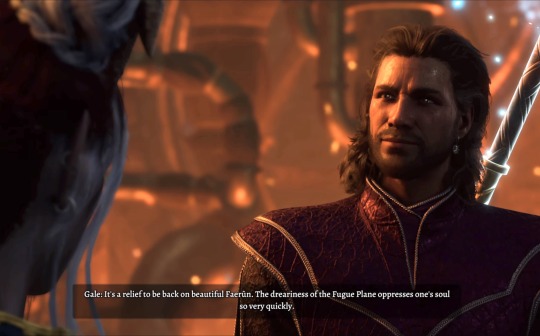
Gale: It’s a relief to be back in beautiful Faerûn. The dreariness of the Fugue Plane oppresses one’s soul so very quickly.
[mumm's note: yes my man died in service of a Tactician battle against Grym, but he got better]
It's a little surprising to see how adamantly Gale would prefer to choose the Netherese orb over letting himself or anyone he cares for become illithid. Look at some of what he says when he tries to offer the orb as an option for the final battle:

Gale: An easy proposition for the Emperor to make - 'become a mind flayer' - it has no soul to sacrifice. If it did - perhaps it would understand the weight of what it's asking of us. And why we might seek an alternative.
I couldn't get this next dialogue to trigger in my game, but in the same conversation as above you might potentially get the option to remind him about Mystra's offer to cure his orb condition, and even then he reminds you of the stakes that come with becoming a mind flayer.

Player: Mystra will cure you if we bring her the Crown of Karsus. You don't need to do this.
Gale: To cure me of the orb, yes. But what of the guilt of allowing one of my friends to sacrifice their very soul and become illithid?
Now keep in mind, up to this point no one has shown any evidence that turning into a mind flayer won't actually mean the total destruction of one's soul. Up until now, the only evidence anyone has of an original soul remaining intact inside a mind flayer body is the Emperor (we have no frame of reference for who Omeluum was before he was a mind flayer), and most of the companions do not trust the Emperor one bit. So Gale genuinely thinks that becoming a mind flayer means your soul is either destroyed or changed so much that it's no longer you.
I mean, think about it. He's half expecting you to take the tadpole the Emperor offers and literally cease to exist. He's expecting to fight alongside a mind flayer who has, at best, your name and a few scraps of your memory, and at worst, no shred of you at all. Because again, up until this point in the game, none of them realize that they could become a special mind flayer who does actually retain most (if not all) of their soul, including their personality and memories.
Gale literally thinks that blowing up and going to the Fugue Plane is better than you or any companion becoming a mind flayer.
But that's in a companion run. Obviously, if you play him as an Origin, you can have him turn into a mind flayer as a different kind of ultimate sacrifice. The decision plays out the same as a Tav/Durge run or any other Origin run. But after the game ends, Gale gets unique dialogue if he (1) sacrifices himself or (2) does not sacrifice himself and goes to meet Mystra with the Crown in hand.
Any run of his sacrifice (aka, using the orb, regardless of whether or not he is illithid) results in Withers finding him in the Fugue Plane for a brief conversation. This conversation isn't much different if Gale is a mind flayer when he uses the orb, since all it does is add an extra option to their conversation that references being illithid ("One illithid for the whole of Faerûn seems like a fair trade to me," which replaces the option "One wizard for the whole of Faerûn...etc").
(An aside, I don't have an Origin Gale run so I can't test this, but I think if he ends his life on the docks as a mind flayer, the way Tav/Durge can with a knife got the stomach, then he just gets the usual Tav/Durge conversation with Withers about how his form has "something of the spirit" about him. See Part 2 if you're curious about that conversation.)
What this conversation with Withers reveals is how much control Mystra seems to have over his soul, especially if/when he's a mind flayer. If Gale decides to sacrifice himself using the Netherese Orb, Withers remarks about how surprising it is that Mystra hasn’t picked him up yet.

Withers: Who flickers there ‘twixt the shadows? Gale, who didst surrender his very self for the salvation of Faerûn. I feared I might not find thee here - that Mystra would have already plucked thy thread from the tapestry of fate. But she may wait a while yet.
It’s a little unclear if Withers uses “plucked thy thread from the tapestry of fate” to mean Gale gets to go to Elysium or something else, and it’s equally unclear whether Mystra waiting is a sign of displeasure or a sign that she is interested in sending Gale back to the Material Plane. She is capable of doing that, after all, and has frequently resurrected her Chosens, like Elminster, if it suits her.
But I highlight this conversation to show that you can get it as a mind flayer, and (if you are a mind flayer during this scene) that Mystra waiting isn't because he's a mind flayer and she can't find his soul. She waits for a minute regardless of whether he's illithid or not. But Withers is certain Mystra will be able to find Gale's soul, because he was able to find Gale's soul and recognize it as Gale.
So, not to harp on this again and again, but it's proof that turning into a mind flayer didn't destroy Gale's soul. It's still Gale's soul, even in the Fugue Plane, even if he's mind-flayer-shaped, and that soul is still capable of journeying to Elysium, should Mystra bother to find it wandering the Fugue Plane (or wherever he is).
But things are a little different if Gale decides to become a mind flayer and then goes to visit Mystra with the Crown of Karsus in hand. Keep in mind, Origin!Gale always has the option to face off against Mystra after the defeat of the Netherbrain, and this face-off is where he decides to hand over the Crown, become the god of ambition, or straight up try to fight Mystra.
However! If Gale is a mind flayer, he gets a secret fourth option.
If Gale goes to meet Mystra as an illithid with the Crown of Karsus and then gives up the Crown to her, Mystra offers to take Gale to Elysium with her. More than that, she offers to literally restore his humanity and cure him of illithidness.
Sort of.

Mystra: So, Gale of Waterdeep, you have become the inheritor of Karsus’ powers at last. What do you intend to do with them?
Gale: I came to surrender them. The Crown, the Karsite Weave - take it all.
Mystra: This offering cost you greatly. There is no hope in life as an illithid, devoid of soul and conscience. It is within my power to restore your soul, and your humanity, if you are willing to leave the mortal realms behind. Return with me, to Elysium.
No one else is offering this kind of deal to an Origin-turned-mind-flayer. Selûne and Shar don’t care if Shadowheart turns illithid, and Withers isn’t exactly offering to restore souls and humanity (or…mortalness?) to everyone else. This is a signifier of the sheer amount of power Mystra has, yes, but this also hints at some other things.
One, despite evidence of the contrary, Mystra is adamant that Gale-as-illithid is or would be “devoid of soul and conscience,” even though we know that that likely isn’t true (just see Karlach, Tav/Durge, etc). Perhaps Mystra is unaware that Gale is a Special Mind Flayer (seems unlikely), or perhaps she’s simply trying to convince Gale to come with her. After all, what she’s offering is still a kind of reward.
Then again, maybe Gale and/or Mystra fear the long-term effects of illithidness. Maybe over time he would become less and less like Gale, perhaps due to consuming memories, or other factors that come with being a mind flayer. Still, though, saying that his life would be "devoid of soul and conscience" seems like a massive stretch on Mystra's part.
But anyway, the reward for him turning into a mind flayer and giving her the Crown is a restoration of his humanity...but only in death.
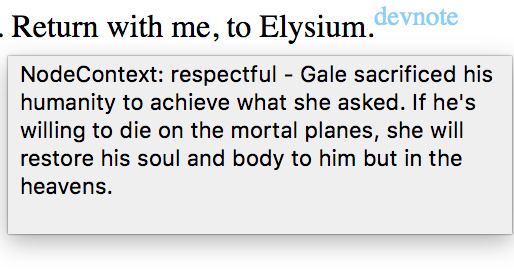
Mystra: Return with me, to Elysium.
Devnote: respectful - Gale sacrificed his humanity to achieve what she asked. If he’s willing to die on the mortal planes, she will restore his soul and body but in the heavens.
Now before I get to what happens if Gale agrees to this reward, I want to point out that Mystra herself sort of acknowledges that Gale isn't exactly devoid of soul and conscience if he refuses her offer. Here are some of the ways Gale can turn her down, with her answer to each option being the same:

Gale: [Option 1] Thank you, but no. I have someone waiting for me.
Gale: [Option 2] Perhaps one day, but for now there is more I need to accomplish.
Gale: [Option 3] Being an illithid has its advantages. I'm content as I am.
Mystra: Then you are free to go with both my thanks and my promise - henceforth, your prayers will always be answered.
The whole idea of an apostolic soul is that it means the person is capable of worshipping a divine being, and this worship ncludes prayers. She might have said that him being illithid would mean he would be devoid of soul and conscience, but in nearly the same breath she promises to answer all his prayers. So she recognizes something of a soul within him. So why say he would be devoid of soul?
Of course, things get weird if Gale accepts her offer to be restored and go to Elyisum. If Gale agrees, then she fulfills her promise and even restores his place as one of her Chosen.

Gale: I crave nothing more. Take me to Elysium.
Mystra: So be it. Gale of Waterdeep, Chosen of Mystra.
Cinematic Tag: Mystra transforms Mindflayer Gale back to his human form (hollow) and grabs Gale’s hand. They return to Elysium.
This is wild to me. You see, originally when I started this project I thought I was going to be writing posts about how interesting it is that when you become a mind flayer, your soul is probably hanging out in the Fugue Plane or something, and eventually I’d suggest that Mystra is able to restore Gale’s soul to him because it’s already gone to her domain or she knows how to find it because he used to be so faithful to her. But none of that works now.
Because now I’m convinced that the Netherese tadpole changes everyone into a Special Mind Flayer whose soul is still present in their mind flayer bodies, just altered or transformed. So what’s up with this stuff from Mystra? She recognizes Gale as Gale even when he's a mind flayer and promises to answer his prayers, so clearly there's some kind of apostolic soul thing going on here. So why does she offer to "restore his soul," and also, why only in death?
She does say that she will restore Gale’s humanity, so now I assume that somehow her powers allow her to un-alter Gale’s soul so that it isn’t so illithid anymore. My idea is that she’s essentially restoring his soul to its former state and not, as we might otherwise infer, literally giving him his soul back, as if it were separate from his body. Gale’s soul is still in his mind flayer body, if all the rest of the evidence holds any water, so Mystra must have merely changed it back to the way it was.
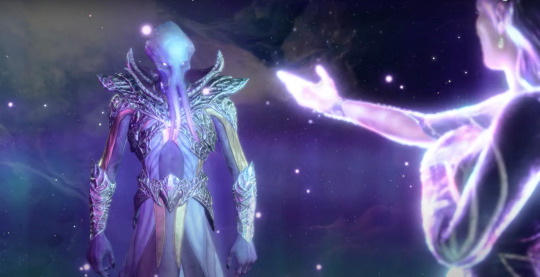
quick picture break, this is from Northalix's video, linked below
Which makes me wonder, can a completely original, apostolic-type soul exist in an illithid body? Or does the body dictate that the soul must be somewhat illithid in order to be compatible?
Because the thing is, this deal comes with an ultimatum. She’s not going to let him go back to the mortal realms after she’s restored his soul. She probably could—she’s probably capable of doing that, if only by giving him a completely new body (she's done that before with Elminster). But she doesn’t. The cure comes with a cost. He only gets to be human again if he agrees to die completely and join her in Elysium. There is no undoing the illithid sacrifice, which seems more like a game limitation than a Mystra limitation (although we can certainly brainstorm reasons why Mystra would be so petty as to basically say "I can make you human again but only if you die completely.")
I want to point out that Mystra doesn't offer to let Gale come back to Elysium as a dead guy if he's not a mind flayer. Like, we don't get the sparkly ascension scene if he blows up with the Netherese orb, we get the Withers visit in the Fugue Plane. This Elysium offer is an illithid-only option. If he's not a mind flayer and he returns the Crown, she cures him of the Netherese Orb and sends him back. There's no option to join her in Elysium. Why is this an illithid-only option?
Also, just...I need you to watch the scene.
youtube
There's a lot that bothers me about this. One, the gestures she makes are the exact gestures God!Gale makes when he ascends Tav/Durge if they romanced him and agreed to become a god with him. Do with that what you will. But two...it just gives me the ick. This is a different kind of ascension for Gale. It's a restoration of his place in Elysium, but it ultimately means his premature death. If this is the route you take as him...it's hardly better than him sacrificing himself using the Netherese Orb without becoming a mind flayer. Only this time, we get to see the scene where he goes to Elysium, I guess.
It also massively complicates the whole idea that everyone gets to be a special mind flayer with a mostly-intact, mostly-apostolic soul. If the soul didn't change, why does Mystra need to "restore" it? And if it did change, why is Mystra the only one capable of un-changing it back to its original form (is it because he’s her Chosen and is/was so faithful)?And if such a thing is possible, why offer it and then say "but you're dead now"?
It seems as though her "fixing" Gale's soul was really just her...I don't know, separating it from his physical mind flayer body so the illithid anatomy wouldn't mess with it as much, and then dusting off his soul, which is now bodyless, and taking it with her to Elysium. I'm not saying that's what she did, but that's the weird vibes I get from this interaction. Like, there seems to be some kind of implication that you can't have a fully humanoid, apostolic soul housed within an illithid body. The soul has to be altered somehow to work with the illithid body.
So why not just give him a new body, Mystra??? Fix is soul and give him a new body! You’re absolutely capable of that!
I have so many questions.
Of course, keep in mind that Gale can reject her, obviously, and return to the mortal realms as a mind flayer. She does acknowledge that he has at least something of a soul that can pray to her so...I mean, there's that.
Anyways, what have we learned?
The Summary
With Karlach, we see that being a mind flayer does necessarily change parts of a person's personality (which, again, is part of their soul). Usually this results in a person seeming calmer, more mellow, less emotional than they normally would have been, but it does seem that for Tav/Durge, the companions, and Orpheus that turning into a mind flayer doesn't completely destroy their soul. It just seems to alter it a bit. In my opinion, the soul just becomes a tiny bit more illithid. Karlach’s case does leave us with questions about how “good” consuming and retaining so many memories might be in the long run, but as of six months post-ceremorphosis, she seems fine.
From Gale, we learn that apparently it's possible to restore or un-alter a partly-illithid soul so that it goes back to normal, but this power is extremely rare and likely relegated to the gods alone (or a particularly powerful Wish spell). We're also reminded that keeping recognizable parts of one's soul, like the personality and memories, is a huge surprise, because that's not how normal mind flayers work. We know this from Orpheus, but Gale just kinda reinforced it.
I guess we also learned that Mystra is a massive—but I should keep this civil. We all know what Mystra is.
It shouldn't come as a surprise that she's unwilling to accept Gale into her domain while he is still a mind flayer, even though his soul obviously would fit the bill based on what a soul is/does for the gods. He has a viable apostolic soul, it’s just mind-flayer-shaped!I'm sure Mystra thinks she's being magnanimous by offering him eternity as a human in Elysium, but I think it ultimately just shows how shallow she can be. Gale only gets to come back if he’s not mind flayer shaped.
And I think, deep down, Gale has always suspected that would be the case.
And on that familiar note, my friends, thank you for joining me on this excessively long deep dive into mind flayer souls and things we can learn from the game and the lore.
~*~*~
If you made it to the end, congrats! More gold stars for you!
✨⭐️🌟⭐️✨⭐️🌟⭐️✨⭐️🌟⭐️✨
If you read through all three parts and also made it to the end of this one, you are the real MVP and I wish I had stickers or achievements to give you so you can be like "I survived another three-part deep dive from mumm." But I don't even have a lousy T-Shirt to offer you.
You can have this random picture instead though :> it's my Tav Dani looking very unimpressed by the Emperor's offer of sexy times (sorry not sorry Empy, she's got a man and his name is Gale and she prefers him and all her friends to be tentacle-free)
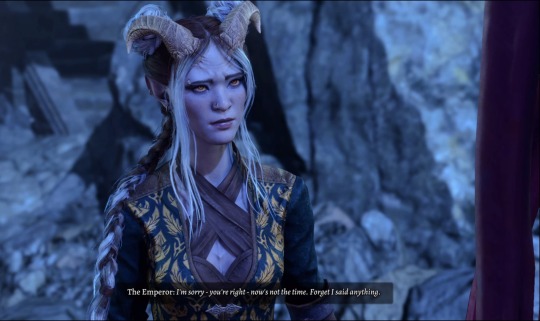
Enjoy the lore and remember that it's all up to you to decide what you want to keep or reject! I'm just showing you what's out there!
Tags for those who wanted an update! @galesdevoteewife @stuffforthestash
#bg3#baldur's gate 3#bg3 meta#bg3 lore#bg3 deep dive#bg3 discourse#gale#gale dekarios#karlach#mind flayer#IT'S DONE#this is the wildest one I think and the one I wanted to write the most so#yay#why do I DO THIS to myself omg
100 notes
·
View notes
Text
the fact of wyll being generally accepting and good toward those who are in the midst of making mistakes, are about to do a folly of some kind, or are perceived as lesser than or in some manner "evil" in society, made me think of how, to an extent I wish we could pry more at his perceptions of monsters as a monster hunter and deep dive into that in conversation but more than that I Do Think about how he reached this point of near unflappable patience and understanding after being raised a noble's son. an honorable noble's son, yes, but a noble still (with his little stories of his Youth he gives a few times.) he doesn't deny that's how he was raised but the expectation of a noble upbringing is so far removed from how he acts today, with you. his patience + sincerity + openness. and thinking of that in the context of how he is proud of the moment he swore his pact, the moment he was shunned, but no one else was proud of him in that moment, no one else even knew. how much that singular moment of such deep misunderstanding and harshness toward him must have embedded in him a very deep capacity for empathy for failure and mishap. no one ELSE was there for him so he can continue to be the Single Person there for you when you're faltering, quite badly, maybe even embarrassingly. no one was there to help or guide him with his pact with mizora either. he had no choice but impulse and hope that he was doing the right thing. as A SEVENTEEN YEAR OLD. so he can be that guy for everyone else in the meanwhile.
#augh... auuuuuugh Wyllyam..........#I still need to deep dive into his romance scenes so his character is a bit more distant to me but he can be such a guy. SUCH a guy.#I'm gonna give you the most insufferable little bard Wyll. don't thank me#and when I say I wish we could deep dive I only mean I'd love to pick a little bit at what his standards are for monstrosity#how he decided who to fight for and against. were there ever moments of hesitation. does HE wonder#if he fought the right people in the past after his thing with karlach.#let me inside your MIND sir#bg3 meta
320 notes
·
View notes
Text
sooo........................i'm making another drow.............
#i downloaded bg3 again#really going into a deep dive into drow culture and history again#clowning time#personal
28 notes
·
View notes
Text
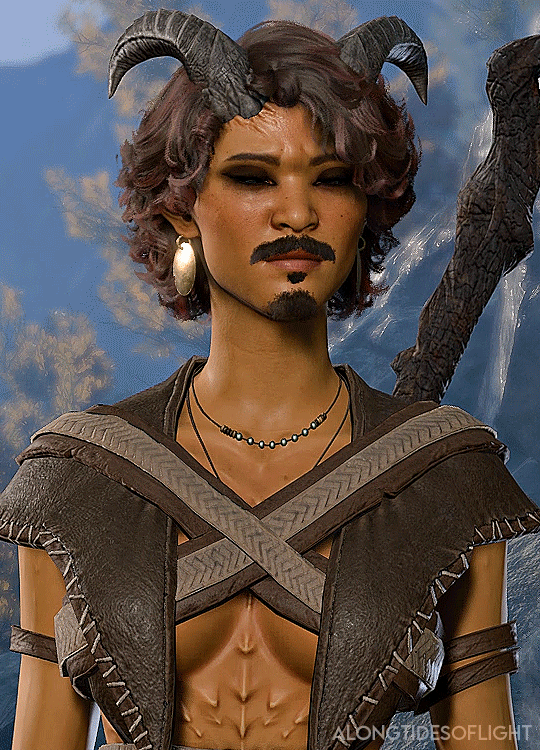

🌱Robin (he/him) [ Zariel Tiefling • Druid ]🌱
#bg3edit#gamingedit#dailygaming#bg3#baldur's gate 3#tiefling#baldur's gate#tav#listen i saw that panel and i had to deep dive into this game again to prepare everything for my playthrough#am i in the middle of my exams? yes. is it 4am and i'm sat here making gifs? also yes.#anyway so halsin huh#anyway so wyll huh anyway so gale huh anyway so KARLACH HUH#the bi panic in this game is real#oc: maddox#myedits#thwacks you with his quarterstaff thwacks you with his quarterstaff thwacks you with his quarterstaff thwacks you wi
142 notes
·
View notes
Note
Hi there! I was just reading your post on Mystra grooming and I thought it was very well articulated I just had one question on it. You mentioned that Elminster reached out to Gale when Gale was 8 years old and I haven't seen that mentioned in the game or in other lore for the game. Would you mind letting me know where that was sourced? Mostly because I'm interested on reading on that more, thank you
Hello there kingtycoon13
SPOILER ALERT: EPILOUGE
The reference to Elminster reaching out to Gale comes from a letter that Elminster writes to Gale when he ascends to Godhood. The letter can be found in a basket full of letters the player can read in the epilogue.

More under the cut
In the Forgotten Realms Wiki, it does say that Elminster took on apprentices from time-to-time. Sometimes they were by Mystra's request.

https://forgottenrealms.fandom.com/wiki/Elminster#Apprentices
We do not know why Elminster appeared on Gale's doorstop when he was eight years old. We do know that Gale was a child prodigy who could summon rabbits when since he was toddler (I cannot find the dialogue for this on the web). If magic was unstable at the time this makes his power an even more impressive feat.
So Elminster had connection with the Blackstaff and was prominent in Waterdeep.
There is every potential that he heard about a boy prodigy who was living with non-magically inclined parents and rocked up to their doorstep to offer help. He might have been thinking about how Mystra will need more chosen when she returns, or he might have just decided that it was time for another apprentice.
On the forgotten realms Wiki it says that Elminster spoke to Mystra who possessed the body of a bear and asked him to find new candidate's to become her chosen. Gale would have been 22 at the time if we go with his cannon age of 35.
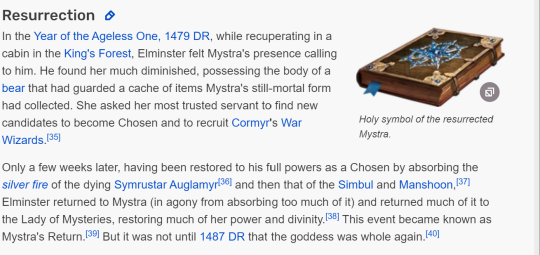
https://forgottenrealms.fandom.com/wiki/Mystra_(Midnight)
I think that Elminster may have suggested Gale as a candidate when Gale was 22. Elminster has helped train her chosen before, such as Sammaster.
There is also a very interesting tidbit I found upon looking him up where he says he left the encounter feeling as though he and Mystra were in love;
https://forgottenrealms.fandom.com/wiki/Sammaster
I do not know to what extent Mystra's presence could be felt whilst she was gone. But Midnight was said to have felt a 'presence' and her spells which might've failed succeeded and she felt like she was being groomed, before becoming the next Mystra. I cannot find any evidence to support a theory that Mystra was behind Gale's ability to cast magic at such a young age. But it is an interesting theory nonetheless.
Anyway, back to my original point. When I said that Elminster had a part to play, I meant that he is a renowned wizard and former chosen of Mystra. And he inserted himself into Gale's life when he was 8. It is implied that he did help him, and potentially recommended him if she did not already have her eyes on him herself.
Elminster does mention making a mistake in his letter, so could that be the mistake he refers to?
We don't know if Mystra sought Gale out as her chosen because of Elminster or vice versa. She may have set her eyes on him regardless but perhaps at a later stage. Either way, Elminster had a part to play in Gale being selected as her chosen.
My idea also stemmed from a post a read a while back where someone wrote Meta's on each BG3 character;
The final point I wanted to make was that grooming does not always involve one person. It can be an organisation or an entire industry which is set up to suck the souls out of people who have talent. Be it academia, sports, the film and music industries or the fictional industry of Wizardry.
But in general the process of becoming a chosen is exploitative and manipulative. We witness that in game with Shadowheart and Lae'zel. They were all groomed in different ways.
#bg3#gale dekarios#My attempt at a lore dive#It's not that deep this is headcannon based on lore information I have read and things in the game#Because the game leaves a lot to interpretation#I am going to regret posting this#It's still grooming#gale of waterdeep#gale defense#mystra hate club#bg3 Gale#bg3 discourse
18 notes
·
View notes
Note
would you say you think you have a decent amount of halsin’s romance left and that there’s more content to come? or do u think its sort of run its course? I’ve seen lots of ppl here say they think his romance is lacking a bit :/
This is gonna have spoilers in it, so SPOILER WARNING BELOW:
Hm... I'm still on Act 3, and I'm not sure to be honest with you. This is still my first play-through, and first romance I've done in the game thus far; but it is definitely less than the others.
The length being shorter is very likely due to the fact that Halsin was added later into development, and it was likely easiest to add the small flirting for the first two acts- THEN add the first romance scene you get with him into the beginning of Act 3. It's disappointing when you compare it to others (Hello Gale, I gave you two magic artifacts and you wanna eat my ass), yeah- I wish he had just as much.
HOWEVER- I do feel like they handled his lack of content in the beginning well enough to give a reason for it; you'll find that Halsin has a bit of a one-track mind imo. The Shadow Curse is something he openly admits he focuses so much on, that he can't think of anything else- and that whenever the curse is lifted- then he can hopefully focus on other things (and onto people- like Tav.)
He's very goal driven in my opinion; after the Shadow Curse is dealt with, he finds himself wondering what to do now- and openly admits to you that he misses the distraction it gave- the thing to do, to focus his attention on, which he has been focusing on for so long- and now it's just... Gone.
So to have him not want to have sexual relations with Tav till after the Shadow Curse is taken care of (meaning finishing the 2nd act) makes sense for him as a character; he can't focus on anything else, and he knows himself he wouldn't be giving himself fully to a relationship while trying to deal with the curse. He jokingly mentions that perhaps if he didn't always talk about/think about this curse, then he may have better luck with getting a lover (This isn't verbatim- it's been a bit since I talked to him and he said this so don't quote me.)
Anyways; that's all to say that yeah, he is lacking compared to others sadly, but I think Larian did a good job at trying to make it make sense as to why he's later than the others. And also, in Act 3, I think I'm starting to get into the meat of his problems that he's dealing with right now- so I'm HOPING that leads to more, we shall see :)
#halsin#mine#halsin romance#i like to uh how do u say... overanaylze characters#and halsin is one im deep-diving on LMAO#sorry for the long-ass answer#bg3#bg3 spoilers#baldurs gate 3
43 notes
·
View notes
Text
Some headcanons about Dammon
that I use in my fics or keep in mind when writing him.
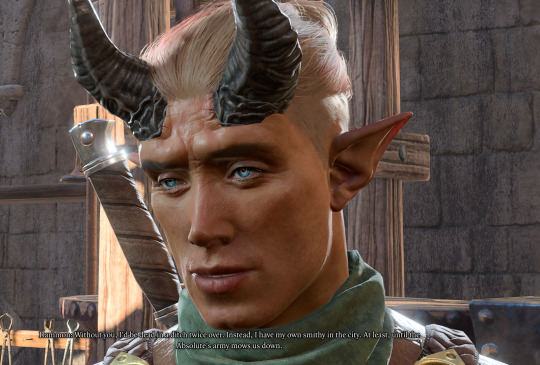
His favorite food is pizza. He makes really-really-REALLY good pizza and lasagna too. But given that he's a tiefling he needs to make both with larger amounts of meat than what is usually found back on Earth. Wanna try meatza, anyone?
He only makes lasagna on special occasions as it takes a bit more time to prepare it before putting it into the oven.
He likes baking more than stovetop cooking due to the precise measurements and the fact he can put something into an oven, and he's free to do something else.
He doesn't think to invest in installing a kitchen into his home until around a few weeks after the Absolute Plot has been resolved. Before then he would frequent the Blushing Mermaid for a bite to eat as needed or use his forge to grill or warm something up.
On his days off he'll usually go into a full-on baking and meal prep frenzy. He plans out his meals for the week so all he needs to do when he gets done working is take a dish out of the ice box and heat it up in a stove.
Aside from pizza, he lives on a variety of casseroles, sandwiches, and roasts. Breakfast is usually eggs and bacon. Yep, no worries about cholesterol in Faerûn. He strikes me as a real meat and potatoes kinda guy but, I would not be surprised if he indulged in spices to put some heat into his meals too.
He knows about Earth-correction, he knows a lot about Earth. To the point he will nerd out over our world's technology and other marvels if the topic is ever brought up. This is due to there are few people whom he can talk to about that place. Fewer still whom can wrap their heads around a world that lacks any magic and where all inhabitants are humans who have managed to come up with a variety of ways to harness lighting/electricity to adapt and thrive.
When it comes to his tools he's a little particular over who touches or moves them. His favorite hammer he's especially not keen on anyone else using. His tools, after all, are his livelihood. And once he gets better ones in Baldur's Gate his possiveness over them only eases up a little bit. Due to the fact, he can at least afford to get a backup set. He takes great care of his tools and likes them arranged and put away just so. It's not a good idea to use or borrow them without asking unless you want to start an argument.
He's always on the hunt for better tools and methods to further perfect his craft. Making basic weapons and armor he can do that in his sleep to pay the bills. Repairs and sharpening don't take him long at all too. But deep down, he would rather make something special and keep challenging himself.
I like to think he's got a love/hate relationship with infernal machinery and iron. He's awed by anything powerful. But like most, I don't think he likes the terrible cost most infernal machinery demands, which is the complete destruction of souls.
He can get sucked into what he's working on and completely lose track of time. As a result, he might stand someone up on a date or be late for an event. Sometimes he might need someone to remind him to take a break. Yes, he's prone to neglect his needs and others when hyperfocused on something.
Like most tieflings, he's ambidextrous and rotates his hammering from one hand to another to minimize strain on his arms. Still, there are times when he pushes himself too hard and needs a long soak in an Epsom salt bath.
Most of the time he smells like a mix of matchsticks (sulfur), coal dust, and the tang of whatever metal he's working on, which is mostly iron. Due to his infernal biology, he doesn't sweat nearly as much as a human or elf would. But at the end of the day, like most, he needs and takes the time to wash up.
He's more of a listener than a talker. Idle chit-chat and small talk he struggles with a little. But bring up Earth or anything related to making things with metal, not just weapons and armor, he's fully locked into the conversation and enthusiastic.
He's not just a blacksmith but a budding Artificer if he's not already one. Dammon after all literally knows how to make explosives and could easily subclass into an Armorer, Artillerist, or Battle Smith.
Both his parents are alive and well to his knowledge. Details I've come up about them are here. His father still lives in Elturel and did not want Dammon to leave. He suggested Dammon hide his true appearance with spells in order to pass as elven and stay in the city. This led to them parting on some disagreeable terms and hurt feelings. At this time, Dammon has no idea where his mother is and has not seen her in a few years. He's not greatly concerned by this and is used to it.
Dammon's childhood was a little lonely especially after his mother left. An only child and only tiefling during his school years he struggled to socialize with others. Did he get bullied for being the only kid with a tail and horns? Of course. But not all of his peers were jerks and he managed to make a few friends.
I like to think once Dammon was old enough to attend dances, balls, and other social functions he started crossing paths with Rolan who was struggling to work himself into the wizarding circles in Elturel. Rolan may have been motivated to befriend Dammon to open more doors and snag social invites but only at first. In the end, they do have a genuine friendship. Thanks to Rolan, Dammon was introduced to more tieflings outside of his father's uptight social circle. Being among his mother's people was healing and helped him come out of his shell if only a little.
That's all I got for now. I wish we could have gotten to know him better and gotten more content with him in a DLC. No hate towards Larian over that, my ire is solely over Hasbro for laying off the staff at Wizard of The Coast who were working with Larian for years. Shattering that working relationship was an extremely stupid move on Hasbro's part.
#bg3#baldur's gate 3#dammon#the heartbreak of no dlc is real#headcannons#character deep dive#bg3 dammon#the fact hasbro owns Dammon and our other favorite characters of BG3 sickens me#fuck hasbro
10 notes
·
View notes
Text
Fully just intending to ramble here so don't expect an articulate essay. I'm just thinking about Shadowheart right now. Also I'll tag but major spoilers below the cut.
The amount of childhood trauma this girl goes through. Not only is she physically and mentally abused she's raised as someone who is supposed to idealize this way of living. Instead of looking and seeing a person across the room she inherently knows every way she could physically bring them harm and a slew of ways she could possibly figure out how to do it emotionally.
It just makes me go insane a little at the thought of how many times she'd probably dread going to the mirror but also maybe welcome it? The thoughts of hurting people would go away, she wouldn't feel that guilt anymore. Wondering what must have been going on inside her mind during all of that. Growing up in a place where she was encouraged to fight and hurt but disciplined for caring for an animal.
I think the fact that she's gone through all of this and still has this core of her fighting it so hard while you travel with her. The way that she can lean into kindness and caring. Things that are basically sacrilegious to Shar. Idk I'm rotating her around in my head and I can just picture this constant fight and confusion. Talk about someone who's constantly at war with themselves, but never stopping moving forward. She's such a survivor, and I love her for it.
#bg3#bg3 spoilers#shadowheart#baldurs gate 3#rambles#gil's thoughts#character deep dive#or deeper#shar
44 notes
·
View notes
Text
I was today year's old when I discovered that if you unequip your instruments, you can whistle for the perform action.
#grey's bg3 tag#bg3 posting#i mean#i much prefer the lute#but if you want a whistling troubador#you can have it#also the deva is there#just because he got summoned for the lorroakan fight#and its been kind of funny just having this half naked angel following the group around#no one comments on him#or runs away screaming like the fire elemental#so it all works out#(i actually learned this whistling factoid from a tiny little youtube channel)#(that has been absolutely churning out banger bg3 content)#(on that note check out panicrolling on youtube if you want some very good deep dives and guides into various classes)#ari's og campaign
20 notes
·
View notes
Text
Oh yeah anyway my thoughts are consumed with idea of bg3 modern au me and my bestie had been talking about nonstop
Precisely Orin as a weird TikTok influencer. The sort of religious laid back propaganda you see for the first time and genuinely consider it a satire and the deeper you go you realize it isn't.
"My daily routine in the church of Bhaal" or some shit and she cooks in the video and makes a joke about eating human flesh.
And everyone on the internet at first is like haha cute how she plays into the creepy aspects of it, i'd love to live in a commune too <3 while Orin is spreading murder cult propaganda
#sorry#and of course the millions of youtube commentary videos#a deep dive into tiktokers disturbing account y#this??!! influencer??!! wants to??!!! eat your heart!!!#anyway i love orin sending a lil kiss to ma deranged wife <3#bg3#orin#orin the red#bg3 orin#bg3 au
7 notes
·
View notes
Note
How do Cannor and Minthara deal with culture shock in their relationship? Like differences in etiquette or general stuff like that?
Tav Deep Dives: Cannor/Minthara Culture Shock

Excellent question, thank you! I’m not a drow lore expert so I’m going from what I know of her in-game personality and my homebrew headcanon of his, and will toss off bulleted observations instead of making this a Full-On-Thesis-Essay about Cannor (my utterly ordinary human swords bard) and the killer-drow-paladin love of his life. This will still probably be long and messy, so thanks also for the indulgence.
Our couple's in-game canon ending was destroying the brain and then leveraging that notoriety to take over the city. They’ve accurately concluded that exploiting all their cumulative alliances is the best way to accomplish this, and to do so tactfully they’re posing as performers to tell their own story (because they hate Volo) and remind everyone what they’ve done. However, as @coolseabird noted in their question, there’s still tons of cultural differences with this couple and honestly I’m not sure how long they’ll last post-game. If they do, it might go like this:
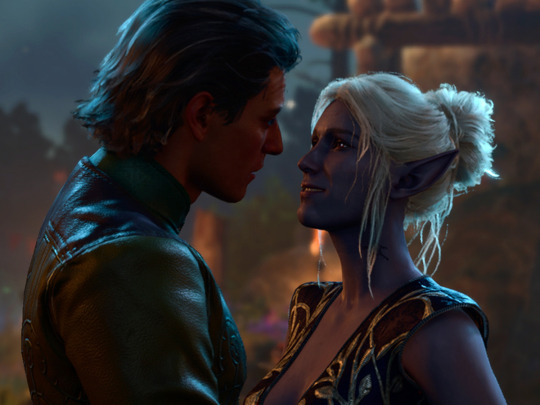
Cannor and Minthara are both mature enough to realize that they've got lots of frictions—little and large—that could derail their relationship. When you’ve lived your life a bit (which at 37+ human years he has, and 200+ elven years she really has), you learn that great gobs of Your Past can be jettisoned at will when no longer relevant. Her story has plenty of this (which you likely already know), but the bard’s background has his share too, on a different scale. With so much of their past selves abandoned, our heroes are free to focus on mutual loyalty, devotion, and common goals—in a very “us against the world” way. He’s her home now, and she’s his purpose.
The primary cultural difference is obviously the surface-human-versus-Underdark-drow mismatch, but there are others. She's noble, he's…sort of, but much less so. She's feared and detested, both prejudicially and justifiably, but he can make friends anywhere. She will almost certainly outlive him. She obsesses over multiple schemes, but he can only focus on one project at a time. She can't shake homesickness, but he's returned to his adopted home city. I imagine they might deal with the day-to-day stuff with whatever (substantial) means they now possess, since money is no object:
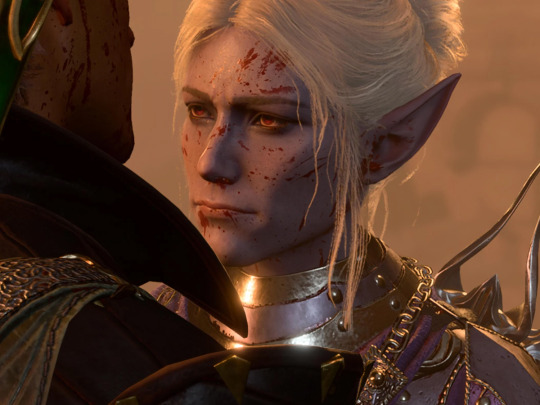
Acclimating to Baldur's Gate, in both its old ways and new/rebuilt ways. Cannor's adopted home has changed a lot during his 7-8 year banishment, so rediscovering the city through Minthara's initial experience of it can expose and interrogate aspects of it he's taken for granted, and can help her understand surface culture using the city as a good, bad, or neutral example.
Avoiding danger. He still doesn’t truly understand that people can try to get to her through harming him which—if they finagle their way into a prominent position of leadership—can still happen. Acquiring a dwelling that is well-appointed enough to sate her tastes, but modest enough to avoid the wrong kind of attention (say one that straddles the Upper and Lower City) is essential. It would delve underground enough to suit her sunless sensibilities, and be secure enough to soothe her paranoia about political retribution or anti-drow prejudice. More practically, she can use this to show him how to appreciate staying in one place. They can each have a corner to retreat to and recharge, to “enjoy their time alone as they enjoy their time together,” as it were.
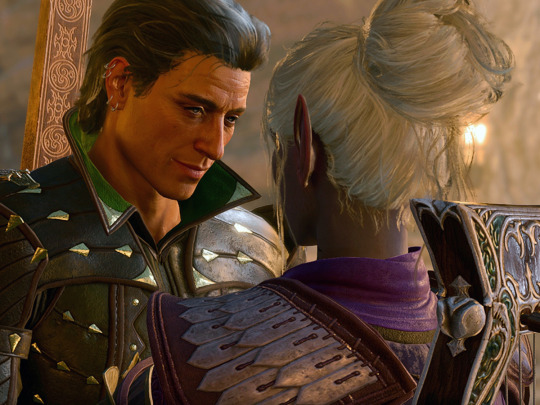
Resolving the issue of "servants", because as someone who's comfortable with menial tasks like cooking, he won't have it, and as a noble-born she's got lots to learn about self-sufficiency. This might be a big sticking point, but perhaps not an insurmountable one given their maturity and backgrounds (more on the latter below). But at some point, she's gotta put recent lessons in humility to use, and he may appreciate that having someone take care of the basics allows them more time to manage their various plots and plans.
Homesickness: Should she miss her banquets, there's enough gold to import rothé ribs, fungal delicacies and spiced Ulaver wine for special occasions (Astarion’s underdark connections are handy!). Furthermore, learning Drowic and Undercommon is a good educational challenge for him.
Family. Whatever desires Minthara may or may not have for children, let alone a "new dynasty", she understands this situation is not ideal for that. Like Mary Stewart's Uther and Ygraine, Cannor and Minthara are lovers for each other, with not much left over for anyone else—and that means a family is unlikely. But to be sure, they agreed to check in with each other every five years or so. At their age, though, there's only so much time.
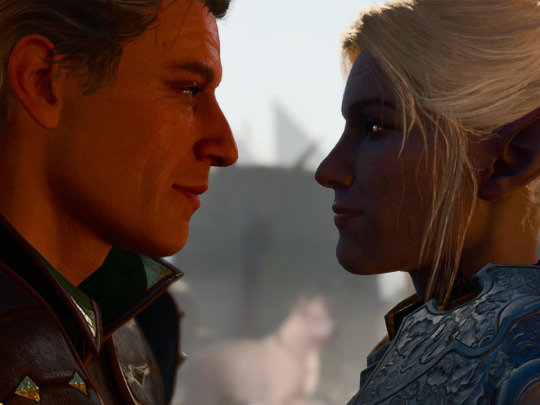
Speaking of age, that specter is always there. She is much older chronologically and used to outliving lovers (for different, deadlier reasons), but he fears becoming so feeble and useless as to embarrass her. She has not yet convinced him that embarrassment won’t happen, because deep down she may not be sure of it herself. The best thing they can do about this is appeciate each day with each other—which they've learned to do via the whole defeat-impossible-foes adventure that threw them together in the first place.
Minthara’s already had to give up a good many trappings of her upbringing (let alone the more sociopathic ones of her past), but she’ll always lust for power and control. Luckily for her, Cannor’s past—he’s the bastard son of a long-lost noble mother—is exploitable. Done tenderly and considerately, but done nonetheless. He barely remembers his mother, and she’s realized those hazy memories are more idealized than true, making him miss the idea of someone and not the actual person.
She’s accurately guessed that as long as she can approximate some of that, she can feed that need, but his lack of focus can rankle. His ambitions are too inchoate; he always needs a project but can only handle one at a time. Why not put those charismatic talents to a use beyond self-pitying confessions? He must choose a direction in life, and she needs that to be what they can do together.
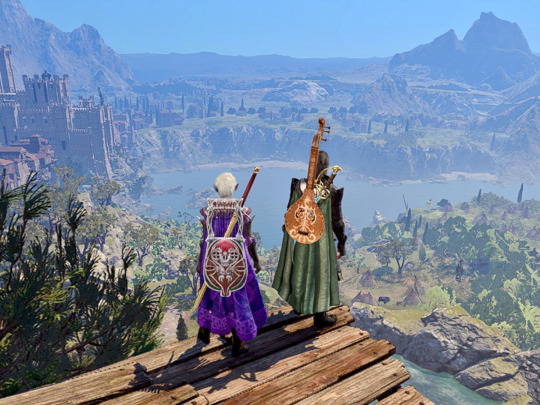
Cannor is discovering what living with a noble—even an exiled one—is truly like. They don't always see eye to eye on ambition. He said things during the game that he didn’t mean to get on her good side, because they had more urgent problems. He hoped destroying the brain would keep her from getting in over her head again. Their current shared goal of taking over the city will either unite or break them forever.
Living together and truly knowing someone can grate within the strongest and longest relationships (let alone those with Big Plans). The opposite of love is not hate—it’s apathy—so if it’s not cultivated constantly, passion can curdle into an aggravated hate that only lovers know. Our power couple understands this, so they’re lucky that their relationship is acts-of-service based and realize they both have to work at it every day. If they last, it’ll come down to that. Wish them luck, because they’ll need it.
7 notes
·
View notes
Text
Illithid Souls - Part 1
What’s up with mind flayers and souls anyway?
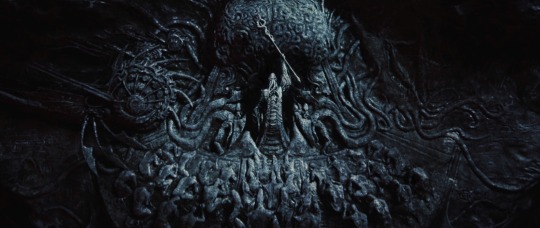
I know this deep dive has been done before like a hundred times, based on all the Reddit threads I’ve read, but I feel like a lot of the "evidence" has been scattered about in a lot of places (reddit, tumblr, other threads, other socials, etc). So I figured...why not gather a lot of it here in one place?
As with all my deep dives, this post is designed to equip you with some lore so you can build your own theories and ideas. I’ll offer theories that I find interesting or feasible, but lore is always a little hazy so I’m bound to be wrong or you’re bound to interpret things differently. Just have fun with the lore!
I’ll start by defining what D&D calls a soul, and then…well it unravels from there. In this part we're going to dive into the lore about souls, the afterlife, and where mind flayers differ, along with a bit of in-game context. In Part 2 we'll look at individual case studies (Tav/Durge, Orpheus, Karlach, and Gale).
Buckle up, folks, cause it's a long one!
As always, I’ll include images and image descriptors/text written out in case the pictures fail or are too small to read!
What is a soul?
The entire game of Baldur's Gate 3 is heavily invested in the idea of souls. Raphael wants to bargain with your soul. Mizora has Wyll's soul bound to a contract. Cazador plans to sacrifice 7007 souls. Vlaakith consumes the souls of her faithful. Karlach wants to collect (and use) soul coins. Every tadpoled follower of the Absolute is called a True Soul. This game is OBSESSED with souls.
But it never actually defines a soul, does it? So what do the official D&D rules say?
Well...they don't. Older editions used to split hairs about the difference between a soul and a spirit, but those older editions also used to say that elves, orcs, and half-orcs didn't have souls, so...we've moved on a bit from those days.
In the game, a book on soul coins defines souls as "the sum of personal and magical essence," which is both helpful and vague. The general player consensus is that a soul is the animating "force" that is made up of memories, personality, intelligence, and (possibly) morality, and that in some cases, such as the spell Speak with Dead, a soul differs from a spirit, which merely "animates" the body but does not actually possess the personality or the thinking capabilities of the deceased (though it may have access to memories).
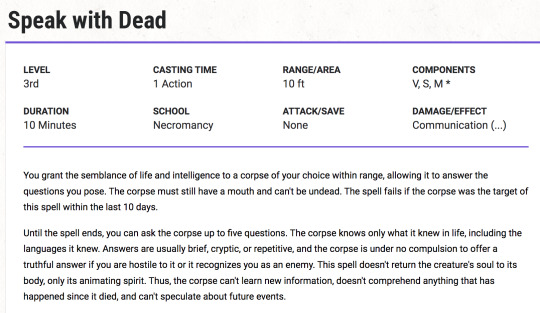
Speak with Dead
[...] Until the spell ends, you can ask the corpse up to five questions. The corpse knows only what it knew in life, including the languages it knew. [...] This spell doesn't return the creature's soul to its body, only its animating spirit. Thus, the corpse can't learn new information, doesn't comprehend anything that has happened since it died, and can't speculate about future events.
So there's a chance that while an entire soul is generally made up of personality, memories, and some element of active thinking/decision making/speculation (intelligence, for lack of a better term), the part of a soul that functions as an "animating spirit" is what houses memory. In other words, animating spirit (memories) + personality + intelligence = soul.
This idea of the animating spirit (memories) being housed within a soul, but also detachable from a soul, is important for later, so remember this in a bit.
Souls also have power, which is why the game is obsessed with everyone fighting over souls. Raphael, Mizora, and Cazador trade in souls in exchange for power. There are insinuations in the game that the gods want to stop the "scourge of soulless illithids" (Mystra's words) because souls are a kind of currency to them (though, trust me, trying to find a recent D&D source that clearly states that particular stance is a damn migraine of an endeavor). But Withers does say that souls imbue gods with power, so the game at least operates with that assumption in mind.
According to Withers…
We all know that Withers, aka Jergal, aka the Final Scribe, aka the former god of death, aka the expert on souls, has plenty to say when you ask him to elaborate on anything:
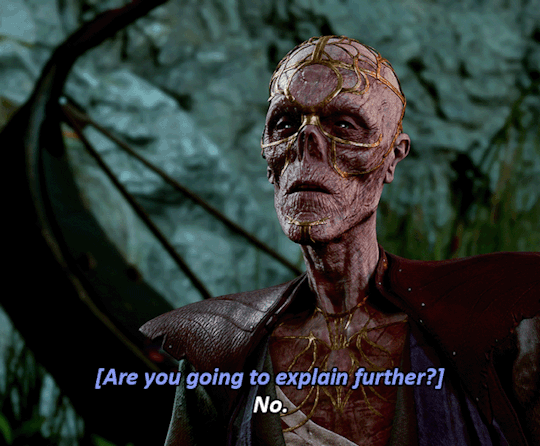
Well, okay, maybe he doesn't. But he does have a bit more to say about souls and mind flayers. For example, when he first brings up the topic of illithids and souls in Moonrise, this is some of the information he can give the player.

Withers: I shall ask yet again. Do illithids possess souls?
Player: These abominations are soulless, surely.
Withers: Correct.
-
Player: I'm not sure. Don't all living things?
Withers: No. Nor canst thou count mind flayers among them.
-
Player: I admit I haven't thought about it.
Withers: Thou shalt think about it now, and I shall give the answer. Mind flayers are soulless. Yet the Three amass an illithid army, void of apostolic souls that could imbue them with power.
A couple of things to note here. Jergal, the guy in charge of putting down the names of people who die and keeping track of where their souls go, is pretty clear that he thinks mind flayers don't have souls. But his last statement clarifies two things: one, that he is referring specifically to apostolic souls (more on that in a bit) and that souls imbue gods with power.
Souls give the gods a kind of strength. He brings this up when he criticizes the dumb plot the Dead Three came up with in his post-epilogue scene:
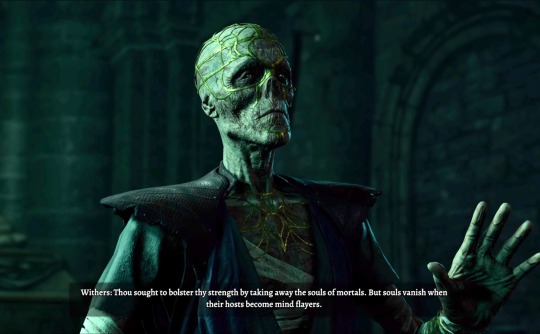
Thou sought to bolster thy strength by taking away the souls of mortals. But souls vanish when their hosts become mind flayers.
So we know that souls are a source of power for deities and gods because they imbue gods with power and strength. But gods only get the power of these souls after a mortal dies with their soul intact. If someone becomes a mind flayer...well, let's just say the natural order of things gets disrupted.
What happens when you die?
You see, normally, when someone dies in Faerûn (assuming they are humanoid), their soul travels to the Fugue Plane where it basically waits around until a deity picks them up or Kelemvor decides they're just going to be part of the Wall of the Faithless for forever. From the Sword Coast Adventurer's Guide (page 20 because I am, as youtuber Swoop says in her docs, a thorough bitch):
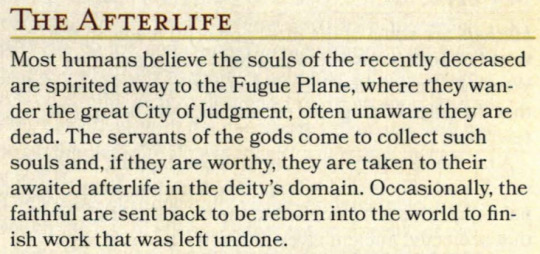
The Afterlife
Most humans believe the souls of the recently deceased are spirited away to the Fugue Plane, where they wander the great City of Judgment, often unaware they are dead. The servants of the gods come to collect such souls and, if they are worthy, they are taken to their awaited afterlife in the deity's domain. Occasionally, the faithful are sent back to be reborn into the world to finish work that was left undone.
This is where the idea of apostolic souls comes in. Apostolic, in its most basic definition, means "having the characteristics of an apostle," or having the characteristics of someone who dedicates their entire lives to the teaching of a particular religious figure (in our context and reality, this mostly means the apostles of Christ, but in BG3 it would refer to any deity). I think here, the definition gets stretched a little thinner to mean any soul that is capable of devotion to a deity, rather than a soul that is already devoted. Apostolic souls can be Faithful, Faithless, or False (which is how souls are separated in the Fugue Plane).
In other words, an apostolic soul is a humanoid-specific soul that the deities recognize and can use as a source of power by inviting said soul into their domain. Mind flayers do not have apostolic souls. Emphasis on apostolic here, but we'll back to mind flayers in a minute. For now, let's look at the Faithless and False souls.
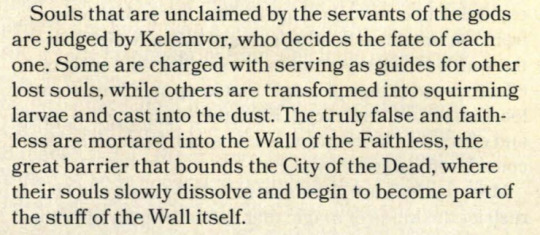
Souls that are unclaimed by the servants of the gods are judged by Kelemvor, who decides the fate of each one. Some are charged with serving as guides for other lost souls, while others are transformed into squirming larvae and cast into the dust. The truly false and faithless are mortared into the Wall of the Faithless, the great barrier that bounds the City of the Dead, where their souls slowly dissolve and begin to become part of the stuff of the Wall itself.
Depressing.
The distinction between a Faithless and a False soul is a little hazy, but according to the Forgotten Realms wiki, a Faithless soul is someone who never aligned themselves to the worship of a specific deity or who just didn't believe in the existence of the gods at all (think of Astarion, who outright rejects all gods). A False soul, in contrast, is someone who did believe but failed to serve their god or outright betrayed them (a fate that Gale feels he is faced with for being on Mystra's bad side). Allegedly all the Faithless end up becoming part of the Wall, whereas the False could get mitigated sentences, such as becoming guides for other souls.
Of course, there's nothing stopping deities from combing through Faithless or False souls to collect them into their domains. But it could take a while. Clearly, the more souls a god collects into their domains, the more powerful they become, but the gods are also not exactly fighting over the souls of Faithless or False people, because people can end up waiting hundreds of years before Kelemvor is finally like "guess you're part of the wall now." Your only option to get out of that is to sell your soul to a devil, which isn't a much better fate.
From The Sword Coast Adventurer's Guide, page 25, regarding servants of Asmodeus:
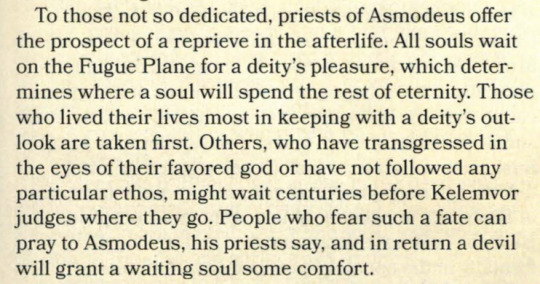
To those not so dedicated, priests of Asmodeus offer the prospect of a reprieve in the afterlife. All souls wait on the Fugue Plane for a deity's pleasure, which determines where a soul will spend the rest of eternity. Those who lived their lives most in keeping with a deity's outlook are taken first. Others, who have transgressed in the eyes of their favored god or have not followed any particular ethos, might wait centuries before Kelemvor judges where they go. People who fear such a fate can pray to Asmodeus, his priests say, and in return a devil will grant a waiting soul some comfort.
This makes me infer two things: first, that the gods are kind of picky about which souls they want to join their domain (regardless of what actually happens to that soul in a deity's domain, which is a topic for a different post entirely, because the results may vary) and therefore the gods aren't just going to go with any soul that ends up in the Fugue Plane. Second, that the gods aren't exactly in a hurry to choose among wandering souls, likely because the Material Plane just keeps producing and destroying mortals, resulting in a constant flow of souls.
We see a glimpse of a god's perspective on the influx of souls when Gale confronts Mystra in the Stormshore Tabernacle (in this case, when you play him as an Origin):

Gale: You're one to talk. How many innocents were you prepared to sacrifice if I detonated the orb?
Mystra: Such eddies are unexpectional. Souls arrive and depart your plane with every tide, in circumstances just and unjust. The Weave cannot be lost because we are unwilling to cause a ripple. And that is what is at stake.
She then goes on to say "With each day that passes, the elder brain threatens to become a new kind of god, its worshippers a scourge of soulless illithids." This is what's at stake. The loss of souls on the Material Plane.
The Absolute plot threatens that cycle of birth and death, of souls arriving and departing. But how, exactly, is the mind flayer plot a threat?
Well, for one, if everyone with a tadpole turns into an illithid (which doesn't have an apostolic soul, Withers is adamant about this), and then all the illithids kill all the non-illithids...who is making new babies with apostolic souls? And if there are no new fresh souls, eventually the deities will just also die out, since no one will be left to believe in them and thus their powers will diminish and eventually fade. It might take a few hundred years, but it still spells death for everyone involved.
The irony here is that it means the Dead Three gambled and lost even if their plan to ascend a Netherbrain ends with a success, such as when Tav or Durge decides to dominate the world by controlling the Netherbrain. Either the brain is destroyed and they lose, or the Netherbrain successfully completes its Grand Design and they really lose, because the only winner here after a thousand years would be the Netherbrain. Thus we have Withers taunting them in the post-epilogue scene by asking if they really thought their ploy would succeed.
Okay...so we know that mind flayers killing everyone on the planet is a bad idea because it means that apostolic souls stop arriving in the Fugue Plane. But what about mind flayers? If they don't have apostolic souls, do they have ANY soul worth eternal currency?
Remember, the only way to create more mind flayers is to tadpole a humanoid creature. Without humanoids, mind flayers can't reproduce. But when humanoids turn into mind flayers, they allegedly lose their souls. Right?
Withers says souls "vanish" when the body turns into a mind flayer. But this is vague, and thus allows for a few different theories. Perhaps souls move on to the Fugue Plane while the person-turned-mind-flayer continues existing on the Material Plane. Perhaps the soul just becomes obscured and unrecognizable by the gods. Or perhaps the soul really does go poof and is replaced by something else entirely.
So which is it? Well...first of all, let's set the record straight on mind flayer souls.
Do mind flayers have souls?
The short answer is...yes. They just don't have apostolic souls.
According to Volo's Guide to Monsters (page 80 for those looking through their copies at home):
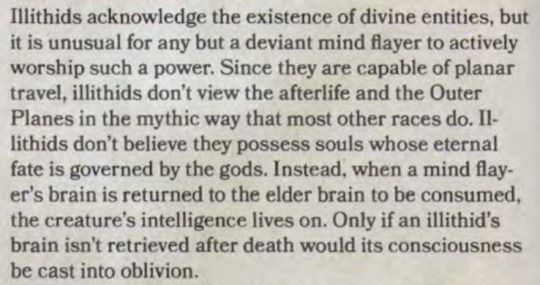
Illithids acknowledge the existence of divine entities, but it is unusual for any but a deviant mind flayer to actively worship such a power. Since they are capable of planar travel, illithids don't view the afterlife and the Outer Planes in the mythic way that most other races do. Illithids don't believe they possess souls whose eternal fate is governed by the gods. Instead, when a mind flayer's brain is returned to the elder brain to be consumed, the creature's intelligence lives on. Only if an illithid's brain isn't retrieved after death would its consciousness be cast into oblivion.
And on page 72:
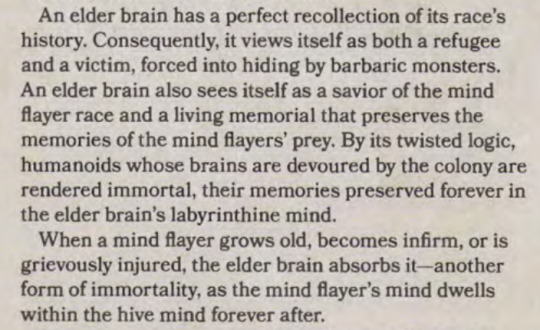
An elder brain has a perfect recollection of its race's history. Consequently, it views itself as both a refugee and a victim, forced into hiding by barbaric monsters. An elder brain also sees itself as a savior of the mind flayer race and a living memorial that preserves the memories of the mind flayers' prey. By its twisted logic, humanoids whose brains are devoured by the colony are rendered immortal, their memories preserved forever in the elder brain's labyrinthine mind.
When a mind flayer grows old, becomes infirm, or is previously injured, the elder brain absorbs it—another form of immortality, as the mind flayer's mind dwells within the hive mind forever after.
So essentially, mind flayers do have a soul, but because they are a) not humanoid but are aberrations from another plane, and b) not faithful to the deities of Faerûn, their souls are not recognized by the gods. The souls might not even journey to the Fugue Plane when they die. Instead, mind flayers give up their consciousness (their memories, especially) to an elder brain to become part of its eternal collective memory.
It's worth noting that Volo's Guide to Monsters puts emphasis on memory and intelligence here, but not necessarily personality. Mind flayers and elder brains do have a kind of personality, because they experience emotions (we'll look at some conversations with the Emperor in Part 2), but their emotional range seems to be a little limited. For example, regarding elder brains:

An elder brain is arrogant, scheming, and power hungry, yet quick to flee or beg for mercy in the face of a powerful foe. It has no conception of joy, sympathy, or charity, but is well acquainted with fear, anger, and curiosity. It is an intellect utterly incapable of empathy or concern for creatures other than itself.
These limited emotions suggest there might be some element of personality here, but it's not exactly the same as a humanoid personality, which would normally be capable of a wider scope of emotional range. We'll talk a lot more about personality and how transforming into a mind flayer alters that part of one's identity (if not their actual soul) more in Part 2, but for now, just know that a mind flayer technically has all the elements usually present in a soul: an animating spirit (memories), intelligence, and personality (emotion).
When mind flayers die, their memories and intelligence are usually consumed by an elder brain, but it's unclear if the personality is too, or if the personality is destroyed. However, if they're not enthralled to an elder brain or if they die and their brain isn't retrieved to give to an elder brain...then their soul is "cast into oblivion."
Being cast into oblivion could mean anything. It could mean that their soul simply wanders around wherever it died, untethered to anything but unable to move on. Or it could mean that their soul simply ceases to exist. No one really knows what happens to it because renegade mind flayers are extremely rare. BG3 has Omeluum and the Emperor, but other than those two, official D&D lore only lists a small handful of other renegades out of millions of mind flayers over time.
So now you're probably thinking, "Well, wait, but is a mind flayer's soul the same soul that a person had before they became a mind flayer?" And the answer to that is complicated.
Let's talk about ceremorphosis
Normally a mind flayer isn't supposed to remember much of its life prior to ceremorphosis. This is partly why mind flayers eat brains, so they can literally absorb the memories of other creatures and make those memories part of the hive mind. But initially, after ceremorphosis, it seems like the the usual animating spirit (memories) of a person gets destroyed or displaced.
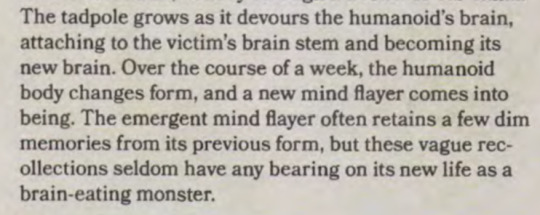
The tadpole grows as it devours the humanoid's brain, attaching to the victim's brain stem and becoming its new brain. Over the course of a week, the humanoid body changes form, and a new mind flayer comes into being. The emergent mind flayer often retains a few dim memories from its previous form, but these vague recollections seldom have any bearing on its new life as a brain-eating monster.
So right off the bat, a typical mind flayer loses the memories (perhaps the animating spirit) of the original host, and it's likely that it loses a lot of the initial personality as well (since it seems likely to lose some of the emotional range). Its intelligence is likely altered too, since the tadpole is literally eating brain matter. So this could lead us to believe two things.
First, that ceremorphosis utterly destroys the host's body and the host's soul likely goes to the Fugue Plane because they have basically died. Their brain has been consumed and their body transformed, so in essence they can't be themselves anymore. Instead, a new soul has taken residence inside the mind flayer body, though where this soul comes from is unclear since tadpoles probably don't have souls. The original soul, however, is free to move to the Fugue Plane and beyond.
Or, alternatively, the host's soul is transformed, shedding memories and personality to become a non-apostolic soul that aligns with an elder brain's hive mind somehow. This means that the host's apostolic soul might be destroyed because it's been changed so drastically, but there are some parts of the original soul still left (the lingering memories, for example). This means the host's original soul didn't move on, but is tethered to the mind flayer body and has been changed into something unrecognizable. When the mind flayer dies, the former apostolic-soul-turned-illithid-soul is either consumed by an elder brain or cast into oblivion.
If the first theory is correct, it seems a little odd that the BG3 companions are so concerned about losing their own souls. If it would just be the same as dying, there would still be some desire to avoid the fate of ceremorphosis, but the companions seem incredibly concerned about losing their own autonomy, as if their consciousness will be trapped inside a mind flayer body and their souls forfeit and unable to move on to the Fugue Plane. After all, Withers is in the business of plucking souls out of the Fugue Plane when we inevitably die in the game.
Specifically, Withers can take a body that has been completely turned to ash and resurrect it with True Resurrection, a spell powerful enough to completely restore a body to its former state. However, there is some assumption here that he wouldn't be able to do this with a mind flayer body, thus the push in the game for a cure.
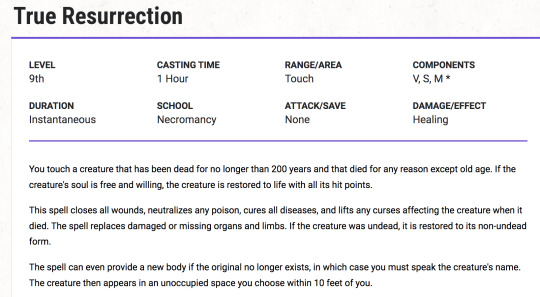
True Resurrection
You touch a creature that has been dead for no longer than 200 years and that died for any reason except old age. If the creature's soul is free and willing, the creature is restored to life with all its hit points.
This spell closes all wounds, neutralizes any poison, cures all diseases, and lifts any curses affecting the creature when it died. The spell replaces damaged or missing organs and limbs. If the creature was undead, it is restored to its non-undead form.
The spell can even provide a new body if the original no longer exists, in which case you must speak the creature's name. The creature then appears in an unoccupied space you choose within 10 feet of you.
In other words, if theory one is correct, and a person simply dies when they become a mind flayer, Withers should technically be able to resurrect them by pulling their soul out of the Fugue Plane and giving them a new body. You'd have a weird mind flayer clone of you running around, but you wouldn't have to worry about ceremorphosis again.
(But then again, we know the game ignores the organ-regrowing properties of True Resurrection for Karlach, too, so the game intentionally limits the capabilities of True Resurrection.)
If theory two is correct, and the lore is extremely unclear about this process if this is the case, then the companions' reactions and dialogues make a bit more sense. They all talk as though turning into a mind flayer means their soul is somehow destroyed. Mind flayers having souls is likely not common knowledge in the universe (certainly no one in the game is arguing that they have souls), so if a person's soul is transformed beyond recognition it could certainly seem like the host's soul got destroyed. Additionally, this would result in a person's consciousness being trapped inside a mind flayer body, so the loss of autonomy would be a terrifying possibility here.
Plus, we know that when a mind flayer dies, the soul they have (whether a brand new soul or an apostolic soul that has been altered) is consumed or thrown into oblivion. So if theory two is correct, there will be no eternal consciousness for you, allegedly (though there's some debate as to how much eternal consciousness you have in the Fugue Plane or the Outer Planes too...)
We don't know which of these theories is correct, and the game sort of slides between these two theories (as we'll see in Part 2). But, and I cannot stress this enough, this lore only applies to normal mind flayers.
BG3 has altered the usual mind flayer tadpoles with Netherese magic such that things get a little wonky. And beyond that, the ultimate tadpole that changes you (or Karlach, or Orpheus) into a mind flayer capable of wielding the Netherstones is a Supreme Tadpole that has been further altered by the Emperor:
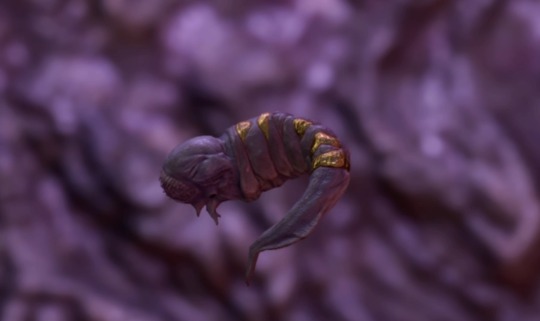

The Emperor: I took this one from the nautiloid. I have been nurturing it ever since - priming it for your use. It is not dissimilar to the experience you already had with the previous one. Only this one is much more potent. All you have to do is open your mind to it. Its latent potential will do the rest.
We don't know how the Emperor has been priming this tadpole, but if it came from the nautiloid, then it is imbued with the same Netherese magic as all the other tadpoles. It's not the same as the Astral-touched tadpole (from Act 2), which has been in the Astral Prism for millennia, but it is somehow more powerful, or at least more effective in transforming you into a new kind of mind flayer, one that can think independently of the elder brain.
So now you (or Orpheus, or Karlach) are a new special kind of mind flayer. Does that change anything?
Yes. In fact, it seems to change quite a lot. But this post is already super long, so you'll have to check out Part 2 to see what I mean.
~*~*~
You made it to the end! Gold stars!!!
✨⭐️🌟⭐️✨
I'll link part 2 soon~
Tagging those who wanted an update! @galesdevoteewife @stuffforthestash
#bg3#baldur's gate 3#mind flayer#the emperor#bg3 lore#bg3 meta#bg3 deep dive#deep dive#long post#super long post#yall the days I put into this#who let me do this to myself
59 notes
·
View notes
Text
ok but why is there no Astarion x Halsin content? hello???
#bg3#halsin x astarion#astarion x halsin#baldur's gate 3#and i meant it#no oc. just them.#me: they're so different it's hilarious#also me: umm where?#when you deep dive into astarion's story it kinda starts making sense#halstarion
39 notes
·
View notes
Text
I've been working on the book of atlantic deep dive, and I DIDN'T REALIZE HOW MUCH BLATANT TWIN FORESHADOWING THERE WAS!!! I'm feasting. I'm having a good time.
#deep dive should be up on november 12th btw#that is the deadline i'm giving myself#and then we can start working on the weston one#amongst a bunch of bg3 character analysis videos
11 notes
·
View notes
Text
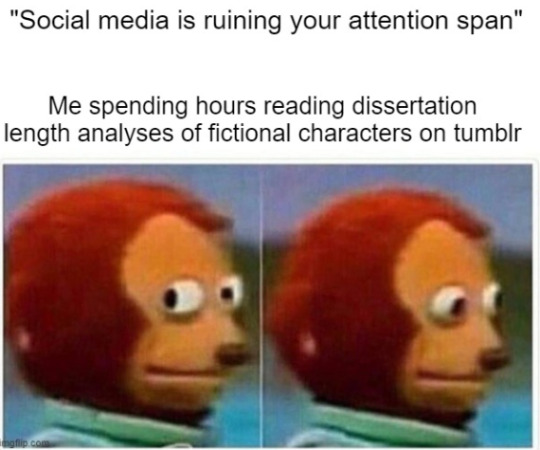
#bg3#baldur's gate 3#I live for people's deep dives into small details about characters#tumblr brain rot#pls send me discourses on random characters
19 notes
·
View notes
Text
Idk what brain malady this is but if I spend a whole day at work listening to one specific podcast or book my internal mental background noise just becomes jibberish in the same tone and cadence as the hosts/narrators
#its happened with deep dive in the shallow end and how did this get made#and when i was listening to dune and the plague dogs#and now its happened with neil newbon playing bg3
2 notes
·
View notes